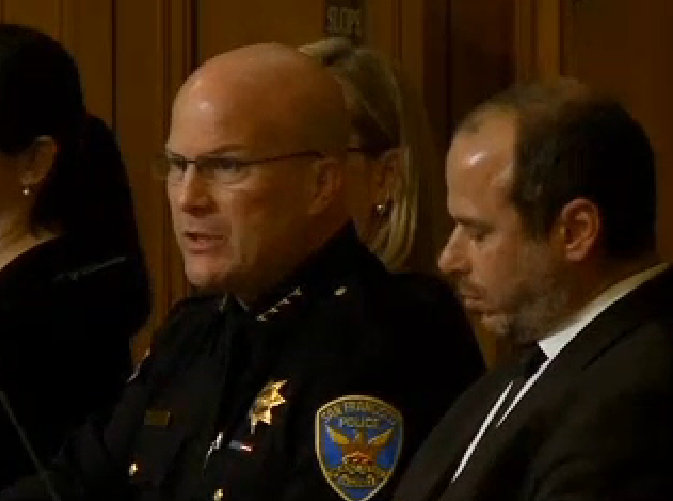[Editor's note: Streetsblog will not be publishing Monday in observance of Martin Luther King Jr. Day.]
The conversation is changing when it comes to the SFPD's approach to traffic violence. That much was clear at a four-hour hearing at City Hall last night, where SFPD Chief Suhr and Traffic Company Commander Mikail Ali pledged to pursue Vision Zero, the call to end traffic fatalities within ten years.

Suhr told city supervisors and the Police Commission, in a room packed with citizens, the SFPD's command staff, and every police captain, that "we are committed to a new normal in San Francisco." And the SFPD backed up the rhetoric by announcing real performance metrics and procedural changes.
The raft of SFPD changes to investigations, citation issuance, and arrests marks a "seismic shift in policy," Suhr told the Bay Guardian in a video interview after the hearing. It's too early to say how deep and lasting these reforms will be, but there is real substance to them.
For the first time, SFPD presented a goal to measure the performance of its "Focus on the Five" program: At least 50 percent of tickets issued should be for the five most common violations in crashes in pedestrian crashes -- drivers' violation of pedestrian right-of-way, speeding, running red lights, running stop signs, and turning violations. In 2013, during which the program was in effect, the number was 22 percent, according to Ali.
A policy change initiated in 2013 also allows officers to arrest drivers in fatal crashes where there appears to be "probable cause," Ali said. That appears to explain the unusual instance of two drivers being arrested for killing pedestrians on New Year's Eve.
In a new policy change for 2014, Ali said SFPD can now also issue citations to a party found to be at fault. Previously, police policy was not to issue a citation in a crash unless the officer witnessed the violation him or herself. One major reason SFPD said they often refrained from issuing tickets was to avoid double jeopardy -- charging someone for the same crime twice -- the theory being if the SFPD issued a citation, the district attorney may not be able to legally file charges as well.
Police will also issue citations or make arrests off-scene, when an investigation later determines fault in a case, said Ali. In fact, Suhr said that SFPD would review collision cases throughout the past year for such opportunities, including that of Jikaiah Stevens, who was hit by a driver who admitted to running a red light, yet faced no penalties. Stevens spoke at the hearing after a short documentary telling her story was shown.
"That driver will be issued a citation," Suhr said. "Going forward, we're committed to making a decision at the scene and/or doing a mailer if it requires follow-up investigation."
Suhr also apologized for the botched investigation of the crash that killed Amelie Le Moullac on her bike last August, as well as the behavior of Sergeant Richard Ernst at her vigil. "Our initial investigation was lacking," he said. "We're better than that."
According to an SFPD presentation, a significant drop in citations in the past year has correlated closely with all-time low police staffing levels, due to funding cuts for the police academy. While city officials said that might partly explains a rise in crashes, it's also crucial that police use data to direct their limited enforcement resources to make the biggest impact on saving lives.
The recent shift in tone from SFPD's top brass is promising. Suhr and Ali have moved away from wagging fingers at "distracted" pedestrians, instead acknowledging that most crashes are the result of driver error, and that drivers have the most responsibility to keep people safe on the streets. Ali also stressed the importance of avoiding the term "accident," using "collision" instead, while Suhr cited survey statistics on the growing problem of distracted driving.
Read more on the discussion from supervisors, police commissioners, and the dozens of public commenters that spoke at the hearing from KQED, the Bay Guardian, the SF Chronicle, and the SF Examiner.
A rally for Vision Zero will be held on the steps of City Hall, Tuesday at 12 p.m., preceding the SFMTA Board of Directors meeting.
Here's the Bay Guardian's interview with Suhr:




